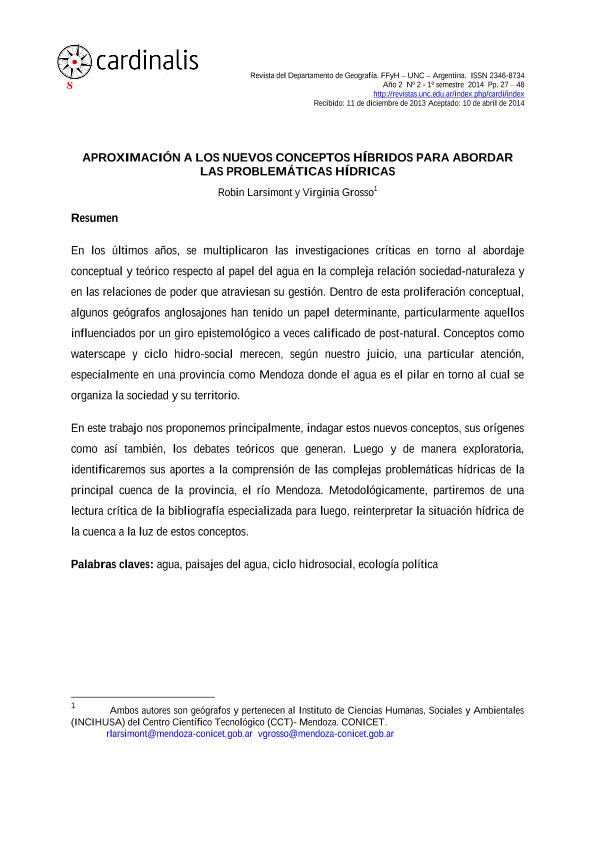Mostrar el registro sencillo del ítem
dc.contributor.author
Larsimont, Robin Sebastien

dc.contributor.author
Grosso Cepparo, Maria Virginia

dc.date.available
2017-08-23T20:24:38Z
dc.date.issued
2014-05
dc.identifier.citation
Larsimont, Robin Sebastien; Grosso Cepparo, Maria Virginia; Aproximación a los nuevos conceptos híbridos para abordar las problemáticas hídricas; Departamento de Geografía. Facultad de Filosofía y Humanidades. Universidad Nacional de Córdoba; Cardinalis; 2; 5-2014; 27-48
dc.identifier.issn
2346-8734
dc.identifier.uri
http://hdl.handle.net/11336/22901
dc.description.abstract
En los últimos años, se multiplicaron las investigaciones críticas en torno al abordaje conceptual y teórico respecto al papel del agua en la compleja relación sociedad-naturaleza y en las relaciones de poder que atraviesan su gestión. Dentro de esta proliferación conceptual, algunos geógrafos anglosajones han tenido un papel determinante, particularmente aquellos influenciados por un giro epistemológico a veces calificado de post-natural. Conceptos como waterscape y ciclo hidro-social merecen, según nuestro juicio, una particular atención, especialmente en una provincia como Mendoza donde el agua es el pilar en torno al cual se organiza la sociedad y su territorio. En este trabajo nos proponemos principalmente, indagar estos nuevos conceptos, sus orígenes como así también, los debates teóricos que generan. Luego y de manera exploratoria, identificaremos sus aportes a la comprensión de las complejas problemáticas hídricas de la principal cuenca de la provincia, el río Mendoza. Metodológicamente, partiremos de una lectura crítica de la bibliografía especializada para luego, reinterpretar la situación hídrica de la cuenca a la luz de estos conceptos.
dc.description.abstract
These last years there has been a growing number of critical studies conveying a conceptual and theoretical approach to the role of water in the complex relationship of society and nature and to the power involved in its management. Within this concepts proliferation, some AngloSaxon geographers have played an important part, especially those who have taken on the challenge of combining the historical-geographical materialist legacy with the network theories—an epistemological turn sometimes described as post-natural. Concepts such as ―waterscape‖ and ―hydrological-social cycle‖ deserve close attention, particularly in a province like Mendoza, where water is at the base of social organization. This work looks into these new concepts, their origins and the theoretical discussions they promote, to further identify their contribution to the understanding of the complex waterrelated
problems in the Mendoza river basin. Methodologically, we start from a critical Reading of the specialized literature followed by a new interpretation of the basin’s
hydrological situation in the light of these concepts.
dc.format
application/pdf
dc.language.iso
spa
dc.publisher
Departamento de Geografía. Facultad de Filosofía y Humanidades. Universidad Nacional de Córdoba
dc.rights
info:eu-repo/semantics/openAccess
dc.rights.uri
https://creativecommons.org/licenses/by-nc-sa/2.5/ar/
dc.subject
Ecología Política
dc.subject
Paisajes del Agua
dc.subject
Ciclo Hidrosocial
dc.subject
Ecología Política
dc.subject
Agua
dc.subject
Water
dc.subject
Waterscapes
dc.subject
Hydro-Social Cycle
dc.subject
Political Ecology
dc.subject.classification
Estudios Urbanos

dc.subject.classification
Geografía Económica y Social

dc.subject.classification
CIENCIAS SOCIALES

dc.title
Aproximación a los nuevos conceptos híbridos para abordar las problemáticas hídricas
dc.title
Approximation to new hybrid concepts to address problems hydric
dc.type
info:eu-repo/semantics/article
dc.type
info:ar-repo/semantics/artículo
dc.type
info:eu-repo/semantics/publishedVersion
dc.date.updated
2017-08-07T18:48:29Z
dc.journal.number
2
dc.journal.pagination
27-48
dc.journal.pais
Argentina

dc.journal.ciudad
Córdoba
dc.description.fil
Fil: Larsimont, Robin Sebastien. Consejo Nacional de Investigaciones Científicas y Técnicas. Centro Científico Tecnológico Conicet - Mendoza. Instituto de Ciencias Humanas, Sociales y Ambientales; Argentina
dc.description.fil
Fil: Grosso Cepparo, Maria Virginia. Consejo Nacional de Investigaciones Científicas y Técnicas. Centro Científico Tecnológico Conicet - Mendoza. Instituto de Ciencias Humanas, Sociales y Ambientales; Argentina
dc.journal.title
Cardinalis
dc.relation.alternativeid
info:eu-repo/semantics/altIdentifier/url/https://revistas.unc.edu.ar/index.php/cardi/article/view/7380
Archivos asociados
